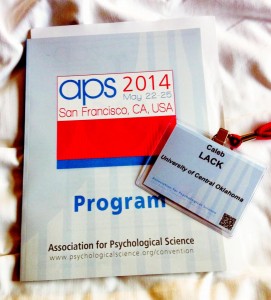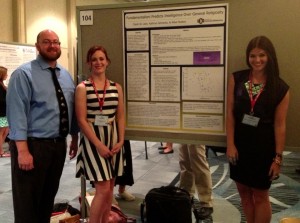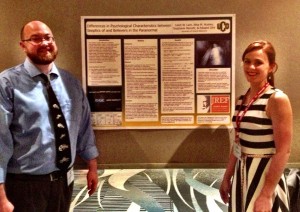 At the end of May each year, the Association for Psychological Science holds it’s annual conference. It’s a particularly good conference to attend to catch up on the latest in scientific psychology and always has a large number of quite well-known speakers and presenters. This year’s conference was no exception, as psychology skeptic notable Scott Lilienfeld gave several talks, one focused on the use of pseudoscience to teach critical thinking skills (something I’ve done for years in my General Psychology and Psychological Science courses) and one on the presence of pseudoscience in clinical psychology.
At the end of May each year, the Association for Psychological Science holds it’s annual conference. It’s a particularly good conference to attend to catch up on the latest in scientific psychology and always has a large number of quite well-known speakers and presenters. This year’s conference was no exception, as psychology skeptic notable Scott Lilienfeld gave several talks, one focused on the use of pseudoscience to teach critical thinking skills (something I’ve done for years in my General Psychology and Psychological Science courses) and one on the presence of pseudoscience in clinical psychology.
On a personal front, I was very proud of my lab, which had a total of six presentations across the four days of the conference. I took five students (two undergraduate and three graduate) with me and we had a great time at the convention and running around San Francisco in general. Some of the presentations we gave will be, I think, of particular interest to regular readers of this blog, as they touch on skepticism, psychology, and religion. I’ve put images of the posters below, along with citations in case anyone happens to want to talk about them elsewhere. We got very good feedback on our work, including invitations to submit to respected journals (which we are working on currently). Now, on to the science!
(Please note that underlining indicates student co-authors)
- Lack, C.W., Schrantz, K.S., & Huskey, A. (2014, May). Fundamentalism predicts intelligence over general religiosity. Poster presented at the annual meeting of the Association for Psychological Science, San Francisco, CA.
 Regular readers of mine may recall that I did a video with Seth “The Thinking Atheist” Andrews last year, in which I was asked to talk about the relationship between intelligence and religiosity. I even wrote a five part series on the topic, which outlined the current state of the literature surrounding this question: “Are the non-religious more intelligent than the religious?” This poster was a pilot study, funded via a Faculty On-Campus Grant from the University of Central Oklahoma’s Office of Research & Grants, designed to specifically address the short-comings of prior research.
Regular readers of mine may recall that I did a video with Seth “The Thinking Atheist” Andrews last year, in which I was asked to talk about the relationship between intelligence and religiosity. I even wrote a five part series on the topic, which outlined the current state of the literature surrounding this question: “Are the non-religious more intelligent than the religious?” This poster was a pilot study, funded via a Faculty On-Campus Grant from the University of Central Oklahoma’s Office of Research & Grants, designed to specifically address the short-comings of prior research.
(Link to full poster on intelligence & fundamentalism)
In short (read the full thing above if you like), we found a very strong relationship between fundamentalist religious beliefs and lower scores on a standardized measure of intelligence in college undergraduates. There was also a strong correlation between general religiosity and lower IQ scores, but this relationship disappeared when the construct of fundamentalism was controlled for in statistical analyses. My explanation for this relationship is that environmental factors that would lead someone to be very high in a fundamentalist religious belief are at the same time suppressing cognitive skills that are measured via a standard IQ test. This could include homeschooling with an emphasis on religious rather than academic learning, not being encouraged to develop critical thinking skills, and the like. We are following this study up with a second grant-funded project over the coming year using the same methodology with a community-based sample of theists and non-theists.
- Lack, C.W., Huskey, A., Menotti, S., & Clint, E. (2014, May). Differences in psychological characteristics between skeptics of and believers in the paranormal. Poster presented at the annual meeting of the Association for Psychological Science, San Francisco, CA. (link)
- Huskey, A., Menotti, S., Clint, E., & Lack, C.W. (2014, May). Higher paranormal beliefs are predictive of poorer mental health. Poster presented at the annual meeting of the Association for Psychological Science, San Francisco, CA. (link)
- Menotti, S., Huskey, A., Clint, E., & Lack, C.W. (2014, May). Gender impacts paranormal beliefs differentially across populations. Poster presented at the annual meeting of the Association for Psychological Science, San Francisco, CA. (link)
 This past year, prior to The Amazing Meeting 2013, I received a grant from the James Randi Educational Foundation to conduct research titled “Believers in versus Skeptics of the Paranormal – What’s the (Psychological) Difference?” My lab collected data not only at TAM, but also throughout the past year on over 600 people to examine cognitive, personality, and demographic variables and their relationship to being a scientific skeptic (or not). This resulted in the three posters listed above.
This past year, prior to The Amazing Meeting 2013, I received a grant from the James Randi Educational Foundation to conduct research titled “Believers in versus Skeptics of the Paranormal – What’s the (Psychological) Difference?” My lab collected data not only at TAM, but also throughout the past year on over 600 people to examine cognitive, personality, and demographic variables and their relationship to being a scientific skeptic (or not). This resulted in the three posters listed above.
Our major findings concerning the differences between skeptics and paranormalists were that those with more skepticism towards the paranormal were:
- Less religious
- Had less preference for order and predictability
- Much higher tendencies to engage in and enjoy thinking
- More tolerant of ambiguity
- Lower in their need to conform to societal standards
- More open to new experiences
- More conscientious
- Less neurotic
- Had better overall mental health
Now I don’t know about you, but those are qualities I enjoy in people (which is probably why I hang around with all you skeptics). This project is finished for now and moving into the manuscript writing phase, so I’ll be sure to let everyone know when the full thing is finished and published.
Finally, I’d like to give a plug to the fine folks at The Psych Store. They had a booth at the conference and it was filled to the brim with very cool stuff, including magnets, jewelry, and temporary tattoos (like the ones below, modeled by my lovely students and myself). They aren’t even paying me to say this, I just thought they were great.

